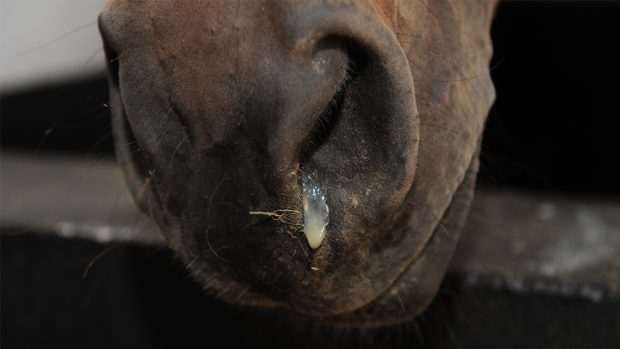Tim Couzens MRCVS
Rain scald is one of the most common skin conditions found in horses when there are long periods of wet weather and, unsurpringly, it is most prevalent during the winter months.
This common skin condition is caused by the same bacteria as mud fever, Dermatophilus congolensis, and affected areas will produce a sticky secretion that causes hair to matt and form scabs.
Once the skin has become damaged, it can be invaded with secondary bacteria like staphylococci.
Signs of rain scald on horses
The condition looks as if the skin has been scalded by water droplets. Dermatitis, especially over the loins and the saddle areas, may appear. Affected areas will start by exuding a sticky secretion which matts the hair together, forming scabs. Under the scabs the area will be moist and pink, and sore when touched.
Diagnosing equine rain scald
Rain scald is usually easy to diagnose, but if you are uncertain ask your vet. It is possible to mistake the symptoms (especially in the early stages) for ringworm and for seborrhoea (excess grease production). Skin samples can be taken and examined microscopically for the bacteria to confirm diagnosis.
How to treat rain scald on horses
Treatment involves cleaning affected areas with antiseptic scrub and applying a solution of 1% potash alum. More severe cases will need antibiotics or penicillin. Herbal and homoeopathic remedies can also be effective when used alongside conventional therapies.
Complementary treatments for rain scald
The following can be bought in dried herb form and added to hard feed:
- Burdock This is good for most skin problems
- Calendula (Marigold) This is useful as it helps to reduce inflammation and assists healing.
- Cleavers This anti-inflammatory herb supports the lymphatic system.
- Nettles These help to dry up sticky secretions and remove toxins from the body.
Several companies now make dry and liquid herbal preparations based on these herbs. Also, look out for treatments which can be applied externally to help heal the areas once the scabs have been removed. Many of these will contain calendula, hypericum or tea tree, which all stimulate the affected areas to heal quickly and help to kill off the bacteria that causes rain scald.
Homoeopathy can also be effective in dealing with rain scald and can produce very rapid results. The most useful remedies are:
- Graphites This is best used before any scabs appear. It is effective in heavy horses.
- Dulcamara This will help heal the skin quickly.
- Rhus tox Particularly useful where the affected areas are sore to touch.
- Mancinella This remedy is effective where the crusts are large and thick.
- Mezerium This is suitable where there are thick scabs with a secondary bacterial infection underneath.
Having selected the most suitable remedy to use, you should dose your horse with the 30c potency twice daily until all the symptoms clear. In most cases this should take no longer than a week.
Prevention of rain scald on horses
Whatever approach you take, general care is as important as any treatment. Affected horses need to be kept dry and should always wear a turnout rug in the field. If possible, provide a field shelter.
Avoid contact with wet, muddy fields (and wet in general) and also try to stop mud splashing onto the skin. Ensure affected horses are stabled in a dry box and that any damp bedding is removed frequently.
Good grooming is also important. Clean your grooming kit to avoid spreading infection by contamination with scabs and hair.
If you found this useful, you might also be interested in:

Struggling with mud fever? Here’s what you need to know to tackle it…

Pus in the foot in horses: signs and treatment
Expert guidance on how to recognise a case of pus in the foot and the best way to deal with

Winter colic: owners warned after a spate of calls
The British Horse Society said many owners have been in touch in recent weeks

Subscribe to Horse & Hound magazine today – and enjoy unlimited website access all year round
Keep up to date with the latest veterinary advice and news in the Vet Clinic pages in Horse & Hound magazine, on sale every Thursday, or join H&H VIP to read these expert vet articles online.




